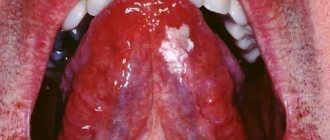- How to distinguish between symptoms of hypothermia and flu?
- Can a cold from hypothermia be contagious?
- How contagious is herpes on the lip?
- Treatment options
What affects the duration of incubation of herpes
Patients often ask questions about what affects the incubation period of herpes in the intimate area or other areas of the human body.
There are a large number of factors that can either lengthen the reproduction period of viral particles or significantly shorten it.
Doctors usually consider:
- age characteristics - everyone knows that infants and older people have weaker immune systems
- environmental conditions - everything that can contribute to a decrease in immunity (staying in a draft, prolonged exposure to the cold, etc.) can lead to a shortening of the period of time from entering the body to the development of a full-fledged disease
- stress also affects the immune system, which can lead to a shorter period of time
Naturally, adherence to proper nutrition, leading a healthy lifestyle, giving up bad habits and a number of other recommendations can increase incubation.
Moreover, in some cases, the virus may never lead to the development of a full-fledged disease, remaining dormant in the body.
How contagious is a cold on the lip to others?
It’s rare that, after a couple of days of seemingly minor discomfort, you don’t feel a characteristic burning and tingling sensation on your lip: “I’ve got a cold again!” Meanwhile, small blisters are symptoms of a herpes infection; it is a very contagious and unpleasant thing. The herpes virus, which, in addition to a “cold” on the lips or on the nasal mucosa, can cause stomatitis, as a rule, lives in the human body for many years, and the manifestation of symptoms begins only when the carrier’s immunity is weakened, for example, during hypothermia. It takes about two weeks from the appearance of a pimple with clear liquid to the bursting of the vesicle. At the site of the opened vesicle, an ulcer forms, which can take up to seven days to heal without treatment. The most contagious stage for others is when the bubbles burst, as the virus concentrate enters the environment and easily infects other people through the mucous membranes of the nose and mouth. Moreover, herpes is easily transmitted through shared towels, dishes, and food. The herpes virus is very tenacious and contagious. In order to help speed up the healing rate and increase local immunity, you can use antiviral agents, for example VIFERON ointment, which should be applied at the first signs of the disease 3-4 times a day. Treatment can be continued for up to 7 days. In addition, you can use VIFERON Gel, which forms a thin film that allows you to use lipstick. This allows women to minimize cosmetic defects from herpes.
Effect of pregnancy on virus incubation
Often, women who are in the period of bearing a child ask their attending physicians about how the incubation of herpes changes during pregnancy.
It is quite difficult to predict changes in this case.
On the one hand, the body does everything to protect the woman herself, as well as her unborn baby, from negative external influences, including viral particles.
On the other hand, pregnancy is a condition of a woman’s body, accompanied by severe immunosuppression.
Otherwise, bearing a fetus would simply be impossible.
Often it is immunosuppression that prevails in the female body.
As a result, the length of time it takes herpes from entering the body to developing symptoms is significantly shortened. It is also worth considering that herpes is quite capable of penetrating the placenta, leading to infection of the child.
Sometimes it leads to the development of congenital pathologies of varying severity.
How dangerous is herpes?
Herpes on the lips is type 1 herpes. A person with herpes on the lips poses a danger not only to others, but also to himself. If you touch the rash first and then another part of the body, you can transfer the infection, for example, to the eyes. Herpetic lesions of the cornea lead to blindness.
Therefore, it is worth observing the following hygiene rules:
- Don't touch the rash. If you accidentally touch it, wash your hands with warm water and soap.
- Use only your own utensils.
- Do not scratch the crusts or squeeze out the bubbles - this will not make the disease go away any faster. You simply risk spreading it to other parts of the body.
- Under no circumstances should you kiss or have sex during an exacerbation. Not only do you risk infecting your partner, there is also a risk of transferring herpes to the genital area. This is a much more unpleasant form of herpes.
Genital herpes (herpes type 2) affects the human genitourinary system. Recently, evidence has emerged that type 1 herpes can cause damage to the genital organs.
It appears in the form of blisters that cause a burning sensation, then the blisters become painful ulcers. Manifestations of genital herpes are a whole complex of unpleasant sensations. Rashes are often accompanied by pain, swelling, tingling sensation, and discharge.
The influence of HIV infection on the incubation period of herpes
Another common question is how the duration of incubation changes during HIV infection.
There is nothing surprising in such a question.
After all, the human immunodeficiency virus is becoming increasingly common in medical practice today.
Much in this case depends on how strongly the patient’s immunity is suppressed.
For example, if a patient regularly takes HIV medications and his lymphocyte levels remain normal, the incubation period may remain within the standard range.
If the patient ignores the doctor’s recommendations and refuses medications, the level of his defense system drops to catastrophic levels.
The result is predictable: the period of time is greatly shortened.
The disease makes itself felt much earlier than if HIV were controlled or completely absent from the body.
Which doctor will help if herpes infection cannot be avoided?
Which doctor should I contact if I still couldn’t avoid a collision with the disease and there is a suspicion of incubation?
This is a very popular question among patients.
This is not surprising, because different types of herpes can be dealt with by different specialists.
If a person has signs of the genital form of the disease, it is worth visiting a venereologist first.
This doctor will be able to prescribe the necessary tests and give recommendations for therapy.
If you suspect infection with the labial form, you can go to a dermatologist, infectious disease specialist, or just a general practitioner.
Any of these doctors will be able to treat the infection using a variety of medications.
Everything is more complicated with the shingles form of the disease.
In this case, it is necessary to contact infectious disease specialists.
They may even decide that the patient needs to be admitted to hospital.
Cold treatment
Many people, even in our 21st century, are sure that colds need not be treated. “It will go away on its own,” they are sure. Alas, this is not the case, and thousands of patients, for example, with an untreated runny nose, develop chronic sinusitis and become regular clients of otolaryngologists. Not to mention the fact that an advanced disease can easily result in bronchitis and other bacterial complications. Therefore, it is necessary to treat a cold after consulting a doctor. In addition to the medications prescribed by a specialist, in case of illness you must adhere to the following:
- Drink plenty of fluids. The liquid should be warm and not sweet. These can be various fruit drinks, compotes, uzvars, herbal teas.
- Disposable hygiene products (handkerchiefs, towels).
- Wet cleaning of the room where the patient is located.
- Ventilate the room, preferably in the absence of the sick person, but if this is difficult, then measures must be taken to prevent the person from becoming hypothermic again.
- Maintaining bed rest, limiting watching TV and working on the computer to reduce the load on the nervous system and ensure normal sleep, which, as you know, is also an excellent medicine.
- According to research data1, the use of the drug VIFERON Suppositories helps not only to quickly relieve symptoms such as runny nose, cough, weakness, but also to reduce the likelihood of complications.
- When caring for a patient, in order not to get sick yourself, take preventive measures, for example, use a medical mask or apply VIFERON Gel twice a day.
Author of the article
Belyaev Dmitry Alexandrovich
General doctor
1 Nesterova I.V.
“Interferon alpha drugs in clinical practice: when and how” // Attending physician, September 2022, No. 9, P. 72
Loading...
Take other surveys
What tests will help detect infection during the incubation period?
Tests during the incubation period, as doctors note, are particularly difficult.
This is due to the fact that viral infections are already difficult to diagnose.
If we are talking about the incubation period, everything becomes even more difficult.
You should immediately forget about such popular and simple methods as microscopy and smear culture.
Of course, seeding is performed in some laboratories with special conditions, but it is more for research purposes.
The most reliable options are ELISA and PCR.
Moreover, as doctors note, PCR usually provides more information, which in itself is more reliable. This is due to the fact that the technique does not detect traces of a pathogenic microorganism in the blood, but detects it itself.
However, it is worth considering that PCR also has limitations.
If at the time of examination there are not enough viral particles in the body (the threshold value is below the detectable value), then the analysis will be false negative.
Features of preventing herpes after infection
Patients who think they are in the incubation period will certainly ask the doctor a question.
What to do to ensure that the disease does not develop fully, but remains in a dormant state.
There really aren't many options.
Firstly, the effectiveness of prevention with Valvir and Valtrex has been proven.
These drugs are taken orally in tablet form and can inhibit the activity of viral particles.
The main thing is to take them according to the doctor-recommended regimen.
However, herpes is a virus that cannot be gotten rid of once and for all.
Today such drugs simply do not exist.
Therefore, for example, the PCR reaction may remain positive during diagnostic examinations.
Doctors additionally note that you should not rely only on medications.
Measures must be taken to increase the overall level of immunity.
To do this, they use immunostimulants, lead a healthy lifestyle, follow a light diet, and engage in physical activity.
How to treat herpes?
It is impossible to completely destroy a virus that has entered the body. But it is quite possible to suppress its activity so much that it does not bother you. In modern medicine, an integrated approach is used for this. The best results are obtained by combination therapy, which involves the use of antiviral drugs (they are available in the form of drugs for internal use and in the form of external agents), as well as drugs that strengthen the immune system. In some cases, the patient is additionally prescribed local analgesics and physiotherapeutic procedures.
Many people are interested in whether it is possible to burn herpes with alcohol? Alas, this method does not affect the virus, but only damages the mucous membranes, so it is better to use special ointments.
What remedies are usually prescribed for herpes on the lips? The table shows a list of the most common medications used to treat the virus.
| Name, dosage form | Description |
| Acyclovir (aka Zovirax). Available in the form of tablets, cream, eye ointments, injection solutions. | An inexpensive antiviral drug that stops the replication of the virus. Addressed to adults and children over 3 years old. Not recommended for use during pregnancy. Antiviral ointment |
| Valacyclovir (aka Valtrex) Available in the form of 500 mg tablets. | One of the best drugs for herpes. It differs from Acyclovir in the method of delivery of the active ingredient. Suppresses the activity of the virus and reduces symptoms. When taking the drug, the risk of infection through contact with other people is reduced. Treatment of herpes in 3 days |
| Famciclovir (aka Famvir) Available in the form of tablets 125, 250 and 500 mg. | Just like Acyclovir and Valtrex, it blocks the replication of the virus. Helps in the treatment of simple virus and the virus that causes chickenpox. Famciclovir is effective against viruses resistant to Acyclovir. Famciclovir |
| Panavir Available in the form of a solution for intravenous injection, as well as in the form of a gel and suppositories (suppositories). | Antiviral, anti-inflammatory and immunomodulatory drug of plant origin. Increases the body's resistance to infections and has an antipyretic effect. |
| Docosanol (aka Erazaban) Available in the form of a cream for external use. | Has an antiviral effect. Intended for use in adults and children over 12 years of age. Pregnant women are prescribed with caution. |
| Proteflazid Available in the form of drops. | Antiviral agent for systemic use. Intended for the treatment of herpes simplex in children and adults. Used in pediatric practice (including in children under 1 year). |
| Flavoside Available in the form of syrup. | Effective in the treatment of herpes simplex, as well as in the treatment and prevention of influenza. Used in pediatric practice (including in children under 1 year). |
The presented list of drugs is far from complete - the doctor, depending on the characteristics of a particular patient, may recommend other drugs. For example, in some cases antibiotics cannot be avoided (if there is a risk of contracting other infections).
What to do if herpes incubation takes a very long time
Doctors have long noticed that not all patients develop herpes according to the standard pattern.
This fact further complicates treatment during the incubation period.
It is worth keeping in mind: if the patient has a strong body, an active immune system, symptoms of the disease may not appear for a very, very long time.
Do you need to worry if there are no symptoms of the disease, although they should be, since infection has definitely occurred?
Until rashes begin to appear, the patient can be calm about his health.
Herpes is not an infection that undermines the body unnoticed.
Its symptoms are quite vivid and difficult to ignore.
If there are no symptoms, then the virus is dormant and does not pose a threat to the body.
Since it is completely impossible to remove a pathogenic microorganism from the body, all that remains is to make efforts to prevent it from becoming more active.
How to distinguish a cold from hypothermia and the flu
The “folk” understanding of what a cold is is very vague. Sometimes, when talking about this condition, a person may mean that he either has the flu, or herpes on the lips, or ARVI. Is it contagious or not, and what is the difference between acute respiratory infections and acute respiratory viral infections?
So, malaise due to hypothermia of the body. As the English proverb says: “There is no such thing as bad weather, only bad clothes.” The cause of hypothermia is precisely carelessness in clothing, due to which a person can walk for a long time with wet feet, or sweat, and remain in the cold air. This disease does not progress quickly. It almost always begins with a reaction of the nasal mucosa. Sneezing, runny nose, nasal congestion appears, and the nasopharynx may swell. This happens because during hypothermia, immunity decreases, and pathogenic bacteria begin to actively multiply; viruses are more likely to penetrate the cells of the nasal mucosa. As a rule, a couple of days after the onset of the disease, a slight runny nose complements the cough and the temperature rises to 38 degrees. All processes during a cold from hypothermia (in foreign literature: common cold) occur gradually. And a doctor called to the house, and in any case it doesn’t hurt to see a specialist, usually diagnoses acute respiratory infections or acute respiratory viral infections. It is the gradual increase in symptoms characteristic of this condition that is the main difference between acute respiratory infections and acute respiratory viral infections and influenza.
- The first sign that you have the flu and not another respiratory viral infection is a high temperature, sometimes 38 degrees or higher, already in the first hours of illness.
- The general condition worsens sharply, there are muscle pains, pain in the eyes, nausea and vomiting may appear.
- A runny nose and cough with the flu appears after a few days.








